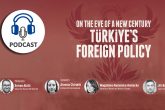“All options are on the table” is the best phrase to describe how Turkey feels about Israel’s attack on humanitarian aid flotilla carrying more than 600 activists from 32 countries. What happened on Sunday night is a real game changer. Israel will, most likely, no longer be seen as a friendly state nor an ally, but will be treated as a rogue state by Turkey.
Hints of this change are clear in Turkish Prime Minister Erdogan’s words describing the attack, “state terrorism”, and from Turkish Foreign Minister Davutoglu’s speech at the United Nations Security Council (UNSC) declaring that “the difference between a state and terrorists is blurred.” These two examples, along with the public outrage expressed through day-long-street protests all around Turkey, testify to the fact that relations between Turkey and Israel will be different from now on. The Turkish side considers Israel as a real threat to regional peace. As a state that commits what Turkish officials call terrorist attacks, attacks civilians indiscriminately, lies openly, and sees itself above the law, Israel has exhausted its legitimacy in Turkey. Under these circumstances, it will be virtually impossible to discuss the Iranian nuclear program without discussing the road map of how to dismantle Israel’s nuclear weapons. Any issue in the region will be discussed through the assessment of Israel as a threat to regional security and peace.
When I say Turkey will imply that “all options are on the table,” I do not mean that Turkey will wage a war against Israel. However, more dangerously, Israel will be seen as a state against which one should protect itself and should consider any possible action because of its unlawful and rogue character. This will have an immense effect on the security architecture of the region unless Israel reconsiders its own security perspective and starts dealing with its neighbors in a manner in line with the international law. It is, however, sad to see the initiatives and perspective of Turkish foreign policy sabotaged by the consequences of the Israeli aggression.
Turkey has long suffered from the paranoia of being attacked by her neighbors. This paranoia has been hurting Turkey at least for more than a century. The guiding principle of the recently renewed Turkish foreign policy activism, “zero problems with neighbors,” was a remedy to this illness aiming to heal the paranoia that used to determine Turkey’s bilateral relations in the region. It is clear that Israel is ailing from this paranoia that Turkey just healed from. Israel’s paranoia not only poisons all peace initiatives in the region, but also harms the already-not-very-pure souls of the neighboring countries. Unfortunately for the sake of comprehensive regional peace, Turkey will most likely define its position as “all options are on the table.” This phrase would not be used openly, but it will surely haunt every statesman in Turkey.
At the policy level, Turkey already started playing its hand and this will continue. By forgoing its right to veto Israel’s membership to the Organization for Economic Cooperation and Development (OECD), which would be considered completely legitimate under any objective criteria, Turkey wanted to send a goodwill message to Israel and to the Israeli public. The message was “Turkey does not have any problems with either Israelis or with all Israeli politicians. Turkey is simply against certain policies of Israel that hurt innocent people and it will not shy away from criticizing Israel for its actions against civilians.” Evidently the message somehow was not conveyed to the Israeli politicians correctly.
If this is the case, then Turkey will play another game by replacing its friendly vocabulary with one that is more proper in describing rogue states: vetoes, embargoes, sanctions, resolutions, terrorism, etc. New vocabulary has already been used by Turkish Foreign Minister Davutoglu in hi
In this article
- Domestic Policy
- are
- Foreign Minister
- Humanitarian Aid
- International Law
- Islamic Republic of Iran
- Israel
- Middle East
- Nuclear weapon
- on
- options
- Prime Minister
- Recep Tayyip Erdoğan
- Sanctions
- SETA
- Terrorism
- The
- The President of the Republic of Türkiye
- Turkish Foreign Policy
- Turkish President
- Türkiye's Foreign Policy
- United Nations (UN)
- United Nations Security Council (UNSC)
- US Sanctions


